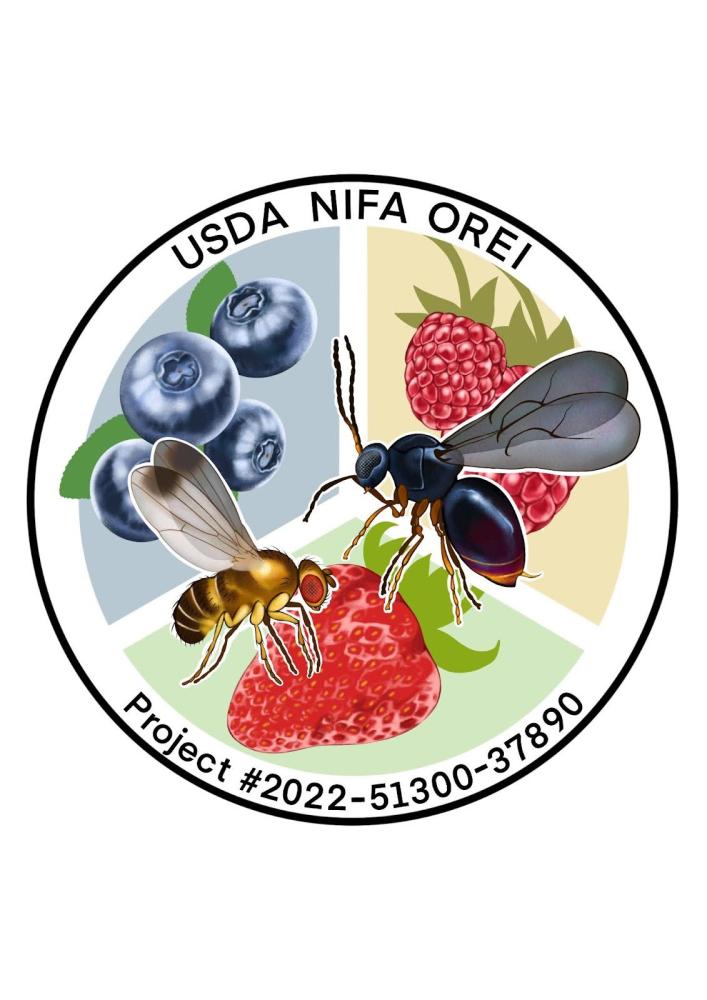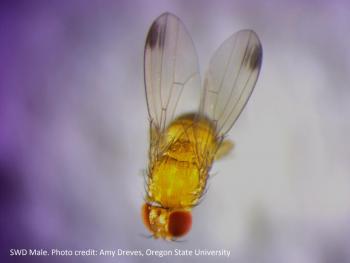About the Organic Management of Spotted Wing Drosophila Project
 This website reports on the results of three USDA NIFA Organic Research and Extension Initiative (OREI) funded projects to help researchers and organic growers across the U.S. reduce damage caused by the invasive pest spotted wing drosophila (SWD).
This website reports on the results of three USDA NIFA Organic Research and Extension Initiative (OREI) funded projects to help researchers and organic growers across the U.S. reduce damage caused by the invasive pest spotted wing drosophila (SWD).
Background
Spotted wing drosophila (SWD) Drosophila suzukii is a devastating invasive pest of small and stone fruits including blueberries, caneberries, strawberries, cherries, peaches, nectarines and grapes in the U.S. Since its first detection in California in 2008, SWD has spread throughout the United States causing significant losses (as high as 100%) in crop yield and quality, which have been estimated at $718 million annually.
Management of SWD is largely achieved by insecticide applications and is particularly challenging for organic growers due to lack of OMRI approved effective materials. We have assembled a multidisciplinary team of organic researchers, horticulturists, entomologists, farmers and extension educators to coordinate the development and delivery of management practices for SWD in organic fruit production systems.
Current NIFA-OREI Project: On-farm Integration of Organic Management of Spotted Wing Drosophila in Fruit Crops
 The overarching goal of this project, led by Dr. Philip Fanning at the University of Maine, is to reduce the economic impact of SWD on organic fruit production across the US. We will develop and evaluate decision-aid tools and thresholds based on new monitoring approaches to achieve this goal. In addition, we will integrate G. brasiliensis into existing crop management practices associated with organic farms. This will increase the implementation of SWD management programs compatible with the USDA National Organic Program (NOP) and true to the ethos of organic agriculture. To achieve this goal, our team has developed three research and extension objectives for organic control of SWD through careful collaboration with stakeholders. These objectives will lead to greater on-farm integration of newly developed practices into NOP-compliant management programs as well as evaluating the impact of G. brasiliensis releases in and around organic farms.
The overarching goal of this project, led by Dr. Philip Fanning at the University of Maine, is to reduce the economic impact of SWD on organic fruit production across the US. We will develop and evaluate decision-aid tools and thresholds based on new monitoring approaches to achieve this goal. In addition, we will integrate G. brasiliensis into existing crop management practices associated with organic farms. This will increase the implementation of SWD management programs compatible with the USDA National Organic Program (NOP) and true to the ethos of organic agriculture. To achieve this goal, our team has developed three research and extension objectives for organic control of SWD through careful collaboration with stakeholders. These objectives will lead to greater on-farm integration of newly developed practices into NOP-compliant management programs as well as evaluating the impact of G. brasiliensis releases in and around organic farms.
- Develop and expand monitoring and economic-based decision-aids for organic agriculture
- Promote beneficial insects in organic fields
- Develop an integrated outreach and education training program to implement organic SWD management strategies.
Previous NIFA OREI Projects on Organic Management of Spotted Wing Drosophila
In 2015 and 2018, two previous NIFA OREI projects on organic mangement of SWD were begun. Both led by Dr. Ash Sial of the University of Georgia with collaborators from multiple institutions around the U.S. Publications, videos and webinars from these projects are available on this website. The objectives of the 2015 project, entitled Development and Implementation of Systems-based Organic Management Strategies for Spotted Wing Drosophila were to:
1. Optimize organic plant protectants and biological controls, focusing on the best possible use of current options for SWD management and limiting non-target effects on natural enemies. 2. Determine factors affecting behavior and movement of SWD and developing tools to intercept SWD at key periods.
3. Evaluate cultural management practices including exclusion and plant canopy and floor management to reduce infestation and population buildup.
4. Develop and deliver extension materials to organic growers including cost-benefit analyses of management techniques.
In 2018, the objectives of the second project, Furthering the Development and Implementation of Systems-based Organic Management Strategies for Spotted Wing Drosophila, were to:
- Evaluate semiochemical-based behavioral tactics
- Improve effectiveness and feasibility of cultural strategies
- Incorporate biological control
- Integrate new OMRI-approved products into season-long IPM programs
- Develop an integrated outreach approach to implement organic SWD management strategies and evaluate their economic feasibility.
Funding

Funding for this website is from the USDA NIFA Organic Research and Extension Initiative (OREI) Program. Grant numbers: 2022-51300-37890, 2018-51300-28434 and 2015-51300-24154.
